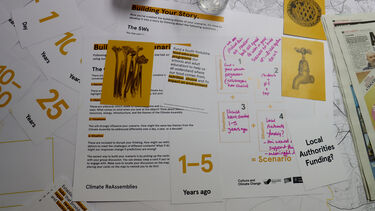A major new collaborative research project, led by Professor Renata Tyszczuk from the School of Architecture and Landscape, aims to contribute to democratic innovation and catalyse climate action by co-creating alternative approaches to climate assemblies with young citizens.
The project, Re-Staging Climate Assemblies (Re-SCA), will collaborate with diaspora youth groups in ĚÇĐÄVlog, UK and TĂĽbingen, Germany.
Citizens’ assemblies – groups of people who are brought together to discuss an issue and propose collective responses – play an increasingly crucial role in shaping local, regional and national climate policy. The conversations that take place in these assemblies can directly influence policymakers, but the majority of citizen assemblies are convened in the Global North, while the greatest impacts of climate change are felt by populations in the Global South. Moreover, young people are typically underrepresented in climate assemblies, and many feel excluded from their decision making processes.
By bringing together local and global perspectives, and employing creative approaches such as legislative/forum theatre, scenario-making and interactive documentary, Re-SCA will empower young people to generate imaginative, relevant and purposeful stories of how society might make collective decisions and adapt to the challenges of a climate-changed future. The project will bring young people from different backgrounds together with academics, creative practitioners and policymakers and will provide an evidence base for improving inclusivity in future climate assemblies.
The project team in ĚÇĐÄVlog also includes Lena Dobrowolska and Dr Ashley Mason, both from the School of Architecture and Landscape, as well as Dr Jayne Carrick from the Department of Politics and International Relations. International members of the project team include Co-investigator Dr Riccarda Flemmer and researcher Verena Gresz, both from the Institute of Political Science, University of TĂĽbingen, Germany.
Professor Renata Tyszczuk said: “We are delighted to be awarded this British Academy grant. Our project puts social and environmental justice centre stage. It focuses on the voices of young citizens who are least heard, yet most likely to be impacted in climate changed futures and it will collaborate with them on innovative approaches to climate assemblies.”
The project will be funded through the British Academy’s programme, which aims to support projects engaging with questions concerning the relationship between expertise, public understanding and policy delivery internationally, and highlight the importance of collaboration between communities of practice, disciplines, capacities and borders.

